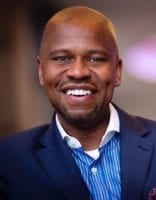 While developing a sophisticated algorithm requires technical expertise, leading a successful business analytics project can’t be done without paying attention to people. That’s the theme of the inaugural Berkeley-Fisher Center Summit for Business Analytics, to be held at the California Memorial Stadium on Sept. 27.
While developing a sophisticated algorithm requires technical expertise, leading a successful business analytics project can’t be done without paying attention to people. That’s the theme of the inaugural Berkeley-Fisher Center Summit for Business Analytics, to be held at the California Memorial Stadium on Sept. 27.
The new event, which is free and open to the Haas community, will explore how data-driven technologies like artificial intelligence (AI) and machine learning (ML) affect people in the workforce, and how organizations can align people with processes to drive the success of analytics initiatives.
“Many business analytics initiatives fail, and our research shows it is due to misalignment with people in the workforce, rather than issues with the technology,” says Gauthier Vasseur, executive director of the Fisher Center for Business Analytics, which is part of Berkeley Haas’ Institute for Business Innovation. “Part of our mission is to educate management, finance and operations leaders on how to help their people become supporters of business analytics projects.”
The event, which kicks off with a dinner gala and awards ceremony on the evening of Sept. 26, is expected to attract an audience of about 100 students, industry leaders, alumni, and faculty to share experiences, learn from the latest research and real-world case studies, and network among peers.
“This summit is Berkeley Haas’ first big event around business analytics, and it matches thought leaders from the private sector with academic researchers and talented students who can join together to solve the biggest business challenges,” Vasseur says.
Why people affect the success of business analytics initiatives

Vasseur shared an example of what happens when an organization overlooks the importance of people. A manufacturing company wanted to use AI and ML technology to solve a very expensive problem: the lost time and productivity that occurs when a machine stops working due to a broken or worn-out part.
The company built a highly sophisticated predictive-analytics platform to assess when parts needed to be replaced. The technology worked very well, but the maintenance workers didn’t trust the predictions and opted against replacing the recommended parts. The problem was that no one had considered their expertise and input, and the company had not shared enough information to earn their confidence in the new technology.
“In the end, the platform provided no benefit to the manufacturer, despite the significant investment and the accuracy of the technology,” adds Vasseur. “Our goal is to give businesses the research findings and tools to avoid these situations.”
Business analytics evolves beyond IT
Launched this year, the new summit reflects how Berkeley Haas has evolved its focus, research and curricula to address one of today’s most urgent business needs: analytics expertise. Formerly known as the Fisher Center for IT and relaunched last February, the center has held conferences for the past six years, focusing on the changing role of the chief information officer (CIO) and recognizing innovative CIOs with an award. This year’s event continues the tradition of presenting the Fisher-Hopper CIO Lifetime Achievement Award and introduces two new award categories: Excellence in Driving Transformation Award and Business Analytics Woman of the Year.
Awards recognize business analytics achievements



This year’s Fisher-Hopper CIO Lifetime Achievement Award goes to David E. Smoley, CIO of AstraZeneca, a global, science-led biopharmaceutical business. At the summit, he will share how he led a performance turnaround that reduced drug development cycle times while reducing IT spending by more than $800 million (48 percent) over three years.
Other awards include the Excellence in Driving Transformation Award, which recognizes The Boeing Company’s CIO and Senior Vice President Ted Colbert, and the Business Analytics Woman of the Year Award, which honors Hewlett Packard Enterprise’s Global Vice President for Big Data, AI, and Innovation Beena Ammanath.
Demystifying business analytics through research and case studies
Vasseur says the goal of the summit is to put data analytics into an actionable context that comprises data, people and processes for business success. Speakers will help unpack what AI and ML are, and how these technologies can be most effectively applied when including people’s support in their design.
Speakers include Haas faculty members Thomas Lee, associate adjunct professor and director of data science at the center; Andreea Gorbatai, assistant professor in the Management of Organizations Group; and Gregory La Blanc, distinguished teaching fellow with the Finance Group. Additional presentations by industry leaders include:
- Sabrina Menasria, Chanel’s head of business intelligence and master data governance
- Todd Wilson, Clif Bar’s senior vice president of IT
- Robert Brown, Cognizant Technology Solutions’ associate vice president for the Center for the Future of Work
- Alexandre Robicquet, Crossing Minds’ co-founder and CEO
- Matteo Melani, Ellipsis Company’s CEO
- Maik Henkel, Global Foundries’ senior manager and deputy director of finance
Tickets for the Sept. 26 dinner gala are still available here for a donation of $250 or more. The Sept. 27 summit is free to all who register at the bottom of this page.